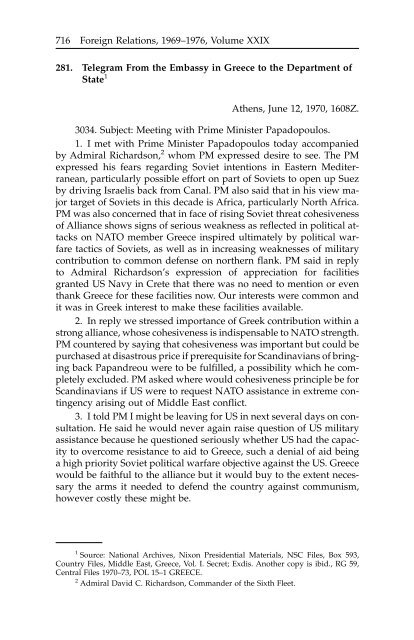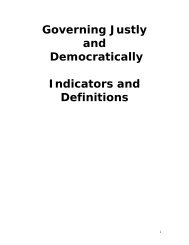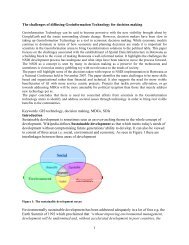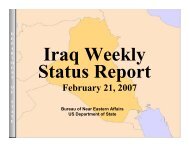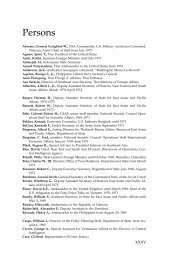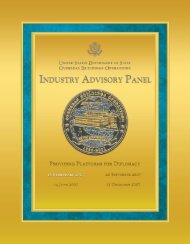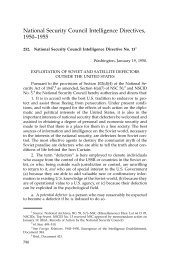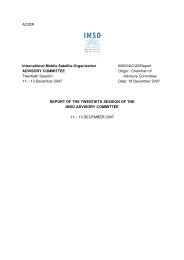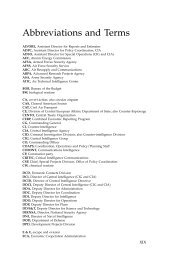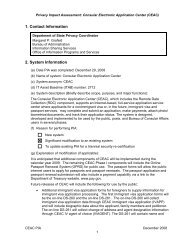Greece - US Department of State
Greece - US Department of State
Greece - US Department of State
Create successful ePaper yourself
Turn your PDF publications into a flip-book with our unique Google optimized e-Paper software.
716 Foreign Relations, 1969–1976, Volume XXIX<br />
281. Telegram From the Embassy in <strong>Greece</strong> to the <strong>Department</strong> <strong>of</strong><br />
<strong>State</strong> 1<br />
Athens, June 12, 1970, 1608Z.<br />
3034. Subject: Meeting with Prime Minister Papadopoulos.<br />
1. I met with Prime Minister Papadopoulos today accompanied<br />
by Admiral Richardson, 2 whom PM expressed desire to see. The PM<br />
expressed his fears regarding Soviet intentions in Eastern Mediterranean,<br />
particularly possible effort on part <strong>of</strong> Soviets to open up Suez<br />
by driving Israelis back from Canal. PM also said that in his view major<br />
target <strong>of</strong> Soviets in this decade is Africa, particularly North Africa.<br />
PM was also concerned that in face <strong>of</strong> rising Soviet threat cohesiveness<br />
<strong>of</strong> Alliance shows signs <strong>of</strong> serious weakness as reflected in political attacks<br />
on NATO member <strong>Greece</strong> inspired ultimately by political warfare<br />
tactics <strong>of</strong> Soviets, as well as in increasing weaknesses <strong>of</strong> military<br />
contribution to common defense on northern flank. PM said in reply<br />
to Admiral Richardson’s expression <strong>of</strong> appreciation for facilities<br />
granted <strong>US</strong> Navy in Crete that there was no need to mention or even<br />
thank <strong>Greece</strong> for these facilities now. Our interests were common and<br />
it was in Greek interest to make these facilities available.<br />
2. In reply we stressed importance <strong>of</strong> Greek contribution within a<br />
strong alliance, whose cohesiveness is indispensable to NATO strength.<br />
PM countered by saying that cohesiveness was important but could be<br />
purchased at disastrous price if prerequisite for Scandinavians <strong>of</strong> bringing<br />
back Papandreou were to be fulfilled, a possibility which he completely<br />
excluded. PM asked where would cohesiveness principle be for<br />
Scandinavians if <strong>US</strong> were to request NATO assistance in extreme contingency<br />
arising out <strong>of</strong> Middle East conflict.<br />
3. I told PM I might be leaving for <strong>US</strong> in next several days on consultation.<br />
He said he would never again raise question <strong>of</strong> <strong>US</strong> military<br />
assistance because he questioned seriously whether <strong>US</strong> had the capacity<br />
to overcome resistance to aid to <strong>Greece</strong>, such a denial <strong>of</strong> aid being<br />
a high priority Soviet political warfare objective against the <strong>US</strong>. <strong>Greece</strong><br />
would be faithful to the alliance but it would buy to the extent necessary<br />
the arms it needed to defend the country against communism,<br />
however costly these might be.<br />
1 Source: National Archives, Nixon Presidential Materials, NSC Files, Box 593,<br />
Country Files, Middle East, <strong>Greece</strong>, Vol. I. Secret; Exdis. Another copy is ibid., RG 59,<br />
Central Files 1970–73, POL 15–1 GREECE.<br />
2 Admiral David C. Richardson, Commander <strong>of</strong> the Sixth Fleet.


